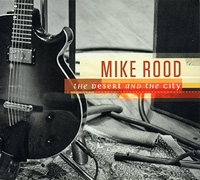 One
of the best and brightest of the new generation of instrumental jazz-fusion
guitarists, Mike Rood comes up with a winner on the 2011 CD release
of The Desert And The City. Featuring liner notes by modern
jazz hero John Patitucci, the eight cut CD was expertly produced
by Rood and features the guitarist in the studio supported by a stellar
group including Alex Spradling (bass), Goh Izawa (drums)
and Mike Bjella (sax). Mike's early guitar influences—including
Hendrix and Stevie Ray Vaughan—yielded to classical studies while
guitar studies with John Patitucci gave a big boost to Rood’s
jazz inclinations. Further studies with notable jazz guitar heroes
including Bruce Dunlap, Vic Juris and John Abercrombie—along
with early recordings made with the son of producer legend, the late,
great Bob Thiele, Bob Thiele Jr. in L.A.—also helped shape much
of the musical greatness in play on The Desert And The City. In
the spirit of jazz guitar icons such as John Abercrombie and Pat Metheny,
Mike Rood is a master at conjuring spacey, hypnotic guitar grooves
that takes the listener on a stimulating sonic journey. Rood's guitar-centric
instrumental fusion sound may evoke images of the ECM sound of the
heyday of the mid ‘70s but on The Desert And The City,
Rood uniquely merges the mysterious sound of the desert and its
barren beauty, with the dense, ravelled soundscapes of the city. www.MikeRood.com
One
of the best and brightest of the new generation of instrumental jazz-fusion
guitarists, Mike Rood comes up with a winner on the 2011 CD release
of The Desert And The City. Featuring liner notes by modern
jazz hero John Patitucci, the eight cut CD was expertly produced
by Rood and features the guitarist in the studio supported by a stellar
group including Alex Spradling (bass), Goh Izawa (drums)
and Mike Bjella (sax). Mike's early guitar influences—including
Hendrix and Stevie Ray Vaughan—yielded to classical studies while
guitar studies with John Patitucci gave a big boost to Rood’s
jazz inclinations. Further studies with notable jazz guitar heroes
including Bruce Dunlap, Vic Juris and John Abercrombie—along
with early recordings made with the son of producer legend, the late,
great Bob Thiele, Bob Thiele Jr. in L.A.—also helped shape much
of the musical greatness in play on The Desert And The City. In
the spirit of jazz guitar icons such as John Abercrombie and Pat Metheny,
Mike Rood is a master at conjuring spacey, hypnotic guitar grooves
that takes the listener on a stimulating sonic journey. Rood's guitar-centric
instrumental fusion sound may evoke images of the ECM sound of the
heyday of the mid ‘70s but on The Desert And The City,
Rood uniquely merges the mysterious sound of the desert and its
barren beauty, with the dense, ravelled soundscapes of the city. www.MikeRood.com
mwe3.com presents
an interview with MIKE ROOD
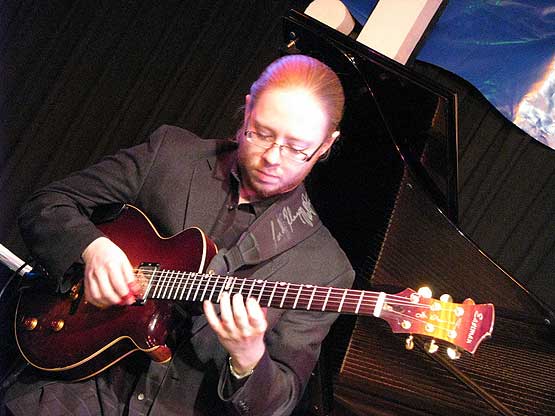 mwe3:
How do your musical influences and background combine and come into
play on your album The Desert and The City? How do your classical
piano and guitar influences come into play on what is clearly a solid
jazz-based guitar instrumental album?
mwe3:
How do your musical influences and background combine and come into
play on your album The Desert and The City? How do your classical
piano and guitar influences come into play on what is clearly a solid
jazz-based guitar instrumental album?
MIKE ROOD: Well, the jazz-based element comes from my training
in school. I’ve listened intently to tons of jazz, much of which
I love, but there is so much music out there that has influenced me
just as much, or even more so. A huge part of the guitar idiom (especially
electric guitar) is based in rock music, and progressive heavy metal
has been a very big influence, but ironically not nearly as much on
my playing as on my composing. I’ve been surrounded by classical
music since before I was born, and I’d say that this is the most
prominent aspect of my musical style. I strive to approach the guitar
more like a classical pianist or violinist approaches their instrument,
and I think that combining this with my jazz improvisation/theory
training, and my being a huge fan of rock music, has resulted in this
album.
mwe3: What were some of the circumstances involved with recording
and releasing the Desert and The City CD?
MR: I had been composing for and performing with my group, The Mike
Rood Communion, for a couple of years, and when the time came to finally
document the music as an album, a whole new process started, which
I’d never experienced before. Early planning involved long phone
calls with bassist John Patitucci, a dear friend and mentor of mine,
getting ideas about studios, engineers, potential costs, etc. We recorded
at the beautiful Avatar Studios in NYC for two days in February 2011.
John Patitucci recommended two names for the post-production: Doug
Epstein to mix and Allan Tucker to master. Doug and I spent about
two and a half weeks mixing the record in February, and I spent a
day mastering with Tuck in March. My good friend Ben Morejon did all
the artwork and designing for the CD, and when John Patitucci wrote
the liner notes, we were ready to have the CDs printed and released.
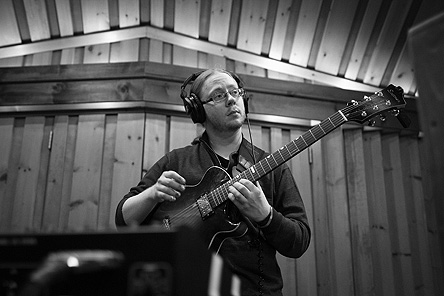 mwe3:
What was the musical chemistry between you and the musicians you worked
with on the Desert and The Cityalbum?
mwe3:
What was the musical chemistry between you and the musicians you worked
with on the Desert and The Cityalbum?
MR: The musicians on the record are some of my closest friends –
Mike Bjella, Alex Spradling and Goh Izawa. We had gone on tour together,
been roommates and gotten broken into in Brooklyn, had tons of barbecues,
spent hours rehearsing, and played dozens of gigs in NY by the time
we went into the studio. We all met at New School a few years ago
and really hit it off personally and musically. Several other awesome
musicians have played in the band, but these guys are the core group
right now.
mwe3: How about producers? What do you look for in a music producer?
MR: I was acting a producer on the album, as I had a very clear concept
of what I wanted. As the leader and composer of the project, I had
rehearsed the music with the band intensely and specifically, making
the recording and editing processes much smoother. From a performing
and producing perspective, I am pretty strict about intonation, dynamics,
and rhythmic accuracy, and I think a good producer knows how to encourage
a strong musical performance and also be able to direct and comment
on things like the band being together or in tune. Doug Epstein, who
mixed the album, acted in some ways as a producer in the post-production,
as he had so much control over the sound of the record from a technical
point of view, and he presented lots of great ideas and solutions
from a different perspective.
mwe3: What was it like working early in your career with Bob Thiele
who was one of the great American pop and jazz producers?
MR: I actually worked with his son, Bob Thiele Jr., and that was great.
It was my first time in the studio, and witnessing what is possible
when recording music just blew my mind. The times I worked with Bob
were with an awesome New York group called The Bailen Brothers Band
– their second CD is coming out very soon.
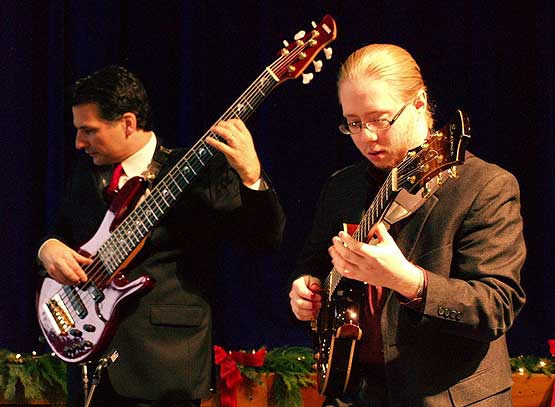 mwe3:
What was it like studying jazz with some of the famous guitar teachers
you’ve studied with?
mwe3:
What was it like studying jazz with some of the famous guitar teachers
you’ve studied with?
MR: It really depends on the musician. Sometimes it is really informative,
and since they are so busy they don’t really do follow-up lessons,
so you cover like 20 years worth of lessons in one lesson. This way
you can really get a quick, but valuable, glimpse into a musician
you really admire. I think many younger players, especially if they
don’t live in NYC, have this notion that if they take a lesson
with a very famous and successful person, they will learn some secret
key to greatness that only the ‘masters’ have, but the teacher
at the local university might be the best teacher for them. Some of
the best learning experiences I’ve had have been with John Patitucci.
He is a very well-known and admired musician, but he approaches teaching
in a very down-to-earth and realistic way that warrants long-term
investment and practice. Also, in just a few lessons with Adam Rogers,
we spent hours playing along with records and doing very difficult
metronome exercises that I will be working on for decades to come.
mwe3: Can you say something about your guitar techniques on electric
guitar including the use of playing with finger picks on your right
hand?
MR: This is a tough one, as the guitarist I learned this peculiar
technique from doesn’t like to be mentioned, but I can say that
the technique is entirely different from classical technique or banjo
technique. The way I play was completely pioneered by this one genius
that I studied with extensively for several years, and as far as I
know, I am the only other guitarist in the world that it utilizing
this specific technique...it is very far out!
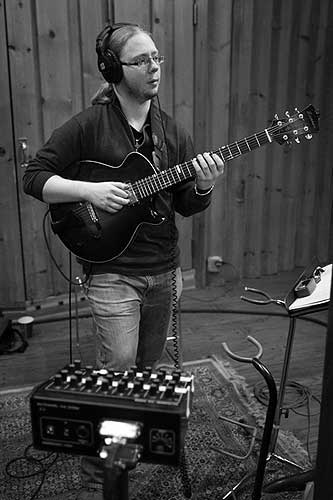 mwe3:
What guitars do you feature on The Desert and The City CD?
Do you play acoustic and classical guitar too? How about strings and
other gear you're currently interested in?
mwe3:
What guitars do you feature on The Desert and The City CD?
Do you play acoustic and classical guitar too? How about strings and
other gear you're currently interested in?
MR: I used one guitar on the album – an Eastman-Otto D’Ambrosio
El Rey hollow body with no F-holes. The design allows for a very natural
and responsive acoustic sound that also has a ton of sustain and doesn’t
feedback. I had some customizations done on it by luthier Keith Vizcarra.
I also play a lot of nylon-string classical guitar and solid-body
electric guitar, both of which I’d like to incorporate more into
the music I play with my group. As far as strings, I just use a basic
D’Addario set with a wound G-string, but I am interested in trying
out some gold-plated high strings, as the ones I use rust pretty quickly.
I used to be really into high-end small-production gear, but now that
I have such great equipment and I am really happy with my sound, I
like to concentrate more on refining my guitar playing with my current
rig.
mwe3: Can you remember your first guitar and can you say something
about it?
MR: My first guitar was a Kent acoustic that my parents bought at
a flea market in Maine when I was about 8. I remember teaching myself
a bunch of Beatles and Roy Orbison songs pretty quickly. My next guitar
was a big upgrade: a Rickenbacker John Lennon model!
mwe3: Who were some of your biggest musical influences, both compositionally
and guitar wise? Also what period in music history holds the most
fascination for you?
MR: I guess I should divide this up by genre. Classical: Strauss,
Ravel, Debussy, Mozart, Stravinsky, Mahler, Brahms, Prokofiev, and
Chopin are huge. Jazz: Egberto Gismonti, Pat Metheny, Herbie Hancock,
John Patitucci, Bill Evans, John Abercrombie, Jan Garberek, Charlie
Haden, Chris Cheek, Stan Getz, and some friends my age that I really
admire: Julian Lage, Ben van Gelder, and Tigran Hamasyan. Rock: The
Beatles, Led Zeppelin, Rage Against the Machine, Dream Theater, Opeth
and Pain of Salvation. Joni Mitchell is an enormous influence. The
musical time period that is most fascinating to me would have to be
the current – right now, as it is what pertains the most to what
I am trying to do musically, and it is the closest we can get to the
future, which is really what fascinates me the most.
mwe3: Where are you living now and how does it effect your musical
experiences?
MR: I am living just outside NYC in southern Westchester, so it is
very easy to get into the city but still be a little separated. That
separation has been very healthy musically, but it is also a little
harder, as the music ‘hang’ isn’t as prominent once
you leave the city.
 mwe3:
What are your current plans for 2011 and beyond?
mwe3:
What are your current plans for 2011 and beyond?
MR: I’ve been writing more music for the group, and we’re
playing several shows in the southwest this summer. We’ll do
some CD release shows in NYC in the fall, as well. I’m going
to be an adjunct professor at NYU starting in the fall while completing
my Master’s degree in music, and will continue promoting this
record while getting ready for the next one!
mwe3: Thank you Mike best of luck to you and your music!
MR: Thank you – you’ll be the first to hear the next record!
Thanks to Mike Rood @ www.MikeRood.com



